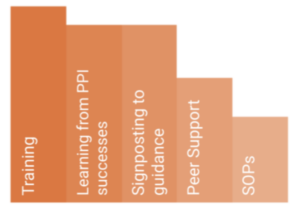Survey Results: Involving Patients and the Public in Pharmaceutical Research
Posted on: Monday 18 November 2024
Author: Dr Canna Jagdish Ghia and Dr Amy Rogers with input from the Working in Partnership with Patients and Communities Forum

Introduction
Patient and public involvement (PPI) in clinical research is well established in the UK, but further improvements are still needed [1]. Earlier this year, the Working in Partnership with Patients and Communities Forum surveyed the FPM membership to find out more about their experiences of PPI.This blog provides a brief overview and interpretation of the survey results.
Who completed the survey?
- Most of the 48 survey respondents were FPM Fellows (69%), followed by Members (21%), with the remainder being Associates and Affiliates.
- Experience working in pharmaceutical medicine ranged between 0-5 years (4%) to over 20 years (71%), with most people currently performing clinical or medical affairs job roles.
- None of the respondents were currently working in a regulatory role. More males than females completed the survey (67% vs 31%).
![]()
What PPI experience did they have?
Almost half of the respondents (46%) have been involved in PPI projects or initiatives as part of their current role.
Some participants specified positive outcomes of PPI activities they had been involved in, from helping to identify problem aspects of proposed trial designs, to developing new patient-reported outcome measures.
“Patients are very willing to engage and to advise. They have particular insights into adverse events, and the clinical significance of adverse events and quality of life issues.”
What PPI resources or training have members found helpful?
Some respondents told us about things that had been useful to them for PPI activities. The most frequently mentioned were learning from peers and PPI-specific training. Other supports included PPI guidance or toolkits, as well as institutional or managerial support for PPI.
We also asked people to rank the following PPI resources according to what they thought would be most useful to increase their confidence in PPI: training, learning from successful PPI, signposting to existing PPI guidance, peer support, and standard operating procedures (SOPs).

What difficulties have members experienced in trying to involve patients or the public?
We asked respondents about the greatest challenge they had encountered in PPI. The responses to this question suggest there is still considerable uncertainty about what is and is not permitted under regulations, the ABPI Code, and corporate governance. Additional challenges included persuading people that PPI is worthwhile, particularly when there are competing demands, and proving the benefit from PPI activities.
Nearly two-thirds of respondents reported they had encountered at least one barrier to PPI. The most common barrier experienced was not knowing who to involve in a project or initiative, closely followed by lack of access to training and guidance or budget and resources. Other organisational barriers included resistance to PPI by managers or employers, as well as corporate compliance issues. Some respondents reported people’s difficulty in understanding the purpose of PPI and lack of evidence of impact or value.
What can FPM do to better support members with PPI?
Respondents gave helpful suggestions on how the FPM can support members to do PPI, including a web page listing PPI resources, sharing examples of positive PPI impact, running workshops with varied speakers, and collaborating with other organisations and sectors to share expertise.
So, what happens now?
The survey provided FPM’s Working in Partnership with Patients and Communities Forum with valuable insights into the members’ PPI experiences, needs, and priorities. We will use the survey findings to plan future FPM activities to support members in their patient and public involvement efforts.

